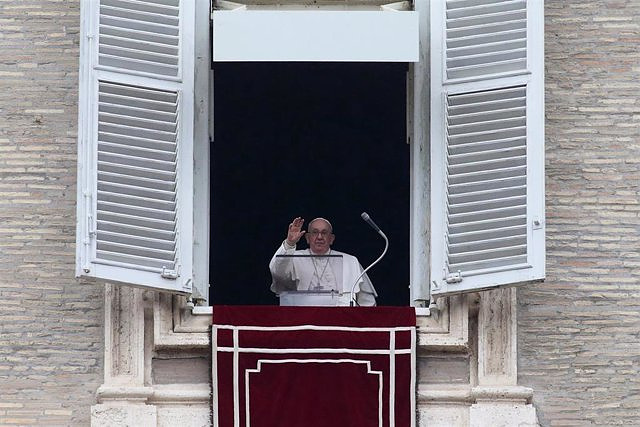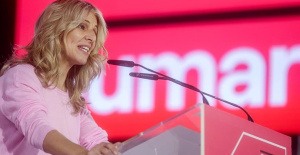Demands a reflection on Artificial Intelligence and that patents on genetic material and human cloning be prevented
ROMA, 8 Ene. (EUROPA PRESS) -
This Monday, January 8, the Pope called for the "universal prohibition" of surrogacy, during his speech to the ambassadors accredited to the Holy See.
For Francis, the path to peace requires respect for life "starting with that of the unborn child, which cannot be suppressed or turned into a commercial product." In this framework, he has deplored "the practice of so-called surrogacy" which "seriously offends the dignity of women and children" and is based on "the exploitation of the mother's situation of material need."
"A child is always a gift and never the object of a contract," he stated. For all these reasons, she has asked that the international community commit to "universally prohibiting this practice."
In the same way, it has shown its repudiation of the so-called "gender ideology" that it has considered part of the "cultural colonizations" of modernity.
For Francisco, there are "new rights, not entirely compatible with those originally defined and not always acceptable", which have given rise to "ideological colonizations", among which "gender theory" occupies a central place, which is " extremely dangerous because it erases the differences in its claim to make everyone equal.
On the other hand, he referred to the "educational challenge" of the ethical use of new technologies among young people, since "they can easily become instruments of division or dissemination of lies, such as the so-called 'fake news', but they are also a "a means of encounter, mutual exchange and an important vehicle for peace."
And more specifically, he has asked for "attentive reflection at all levels, national and international, political and social, so that the development of artificial intelligence - to which he dedicates the annual Message of the World Day of Peace - remains at the service of man." "promoting and not hindering" interpersonal relationships, a healthy spirit of fraternity and critical thinking capable of discernment.
In this sense, the relevance of the two Diplomatic Conferences of the World Intellectual Property Organization, which will take place in 2024 and in which the Holy See will participate as a Member State, has been highlighted.
"Special attention must also be paid to the protection of human genetic heritage, preventing practices contrary to human dignity, such as the patenting of human biological material and the cloning of human beings," he urged.
On the other hand, the Pontiff has shown his "satisfaction" with the commitment of the European Union to "seek a common solution" through the adoption of the new Pact on Migration and Asylum" - highly criticized by NGOs -, although he has pointed out some of its limitations, especially with regard to "the recognition of the right of asylum and the danger of arbitrary detention."
Francisco recalled that in migratory journeys, people put their lives at risk due to "dangerous routes", such as in the Sahara desert, in the Darién jungle, on the border between Colombia and Panama; in Central America, in northern Mexico, on the border with the United States "and, above all, in the Mediterranean Sea."
"The Mediterranean should rather be a laboratory of peace, a 'place where different countries and realities meet on the basis of the common humanity that we all share'", he reiterated to specify, as he did on his trip to Marseille, that this does not It eliminates the fact that migration has to be regulated to "welcome, promote, accompany and integrate" migrants.

 Exploring Cardano: Inner Workings and Advantages of this Cryptocurrency
Exploring Cardano: Inner Workings and Advantages of this Cryptocurrency Seville.- Economy.- Innova.- STSA inaugurates its new painting and sealing hangar in San Pablo, for 18 million
Seville.- Economy.- Innova.- STSA inaugurates its new painting and sealing hangar in San Pablo, for 18 million Innova.- More than 300 volunteers join the Andalucía Compromiso Digital network in one month to facilitate access to ICT
Innova.- More than 300 volunteers join the Andalucía Compromiso Digital network in one month to facilitate access to ICT Innova.-AMP.- Ayesa acquires 51% of Sadiel, which will create new technological engineering products and expand markets
Innova.-AMP.- Ayesa acquires 51% of Sadiel, which will create new technological engineering products and expand markets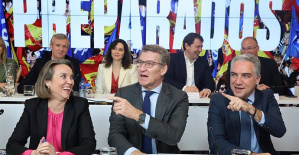 The PP sees the concentration of support for Sánchez in Ferraz as a "failure" and believes that it "complicates" the story of its continuity
The PP sees the concentration of support for Sánchez in Ferraz as a "failure" and believes that it "complicates" the story of its continuity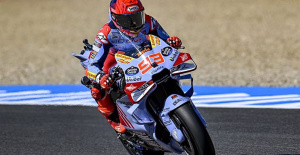 Marc Márquez returns to pole in Jerez
Marc Márquez returns to pole in Jerez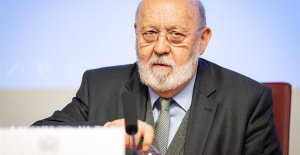 The CIS carries out a quick survey on Sánchez's letter to measure the reaction of citizens
The CIS carries out a quick survey on Sánchez's letter to measure the reaction of citizens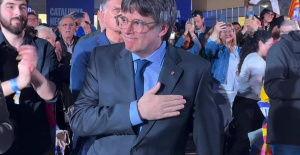 12M.- Puigdemont to Sánchez and Illa: "This is not about the future of the PSOE! What have you believed?"
12M.- Puigdemont to Sánchez and Illa: "This is not about the future of the PSOE! What have you believed?" How Blockchain in being used to shape the future
How Blockchain in being used to shape the future Not just BTC and ETH: Here Are Some More Interesting Coins Worth Focusing on
Not just BTC and ETH: Here Are Some More Interesting Coins Worth Focusing on UPV students build a prototype of a wooden house to move to Equatorial Guinea
UPV students build a prototype of a wooden house to move to Equatorial Guinea The UA opens the call for the Impulso 2024 Awards for the best innovative business initiatives
The UA opens the call for the Impulso 2024 Awards for the best innovative business initiatives ALI, virtual assistant from Alicante, internationally recognized by the OECD
ALI, virtual assistant from Alicante, internationally recognized by the OECD Retrópolis brings the golden age of video games and computing to the UPV
Retrópolis brings the golden age of video games and computing to the UPV A million people demonstrate in France against Macron's pension reform
A million people demonstrate in France against Macron's pension reform Russia launches several missiles against "critical infrastructure" in the city of Zaporizhia
Russia launches several missiles against "critical infrastructure" in the city of Zaporizhia A "procession" remembers the dead of the Calabria shipwreck as bodies continue to wash up on the shore
A "procession" remembers the dead of the Calabria shipwreck as bodies continue to wash up on the shore Prison sentences handed down for three prominent Hong Kong pro-democracy activists
Prison sentences handed down for three prominent Hong Kong pro-democracy activists ETH continues to leave trading platforms, Ethereum balance on exchanges lowest in 3 years
ETH continues to leave trading platforms, Ethereum balance on exchanges lowest in 3 years Investors invest $450 million in Consensys, Ethereum incubator now valued at $7 billion
Investors invest $450 million in Consensys, Ethereum incubator now valued at $7 billion Alchemy Integrates Ethereum L2 Product Starknet to Enhance Web3 Scalability at a Price 100x Lower Than L1 Fees
Alchemy Integrates Ethereum L2 Product Starknet to Enhance Web3 Scalability at a Price 100x Lower Than L1 Fees Mining Report: Bitcoin's Electricity Consumption Declines by 25% in Q1 2022
Mining Report: Bitcoin's Electricity Consumption Declines by 25% in Q1 2022 Oil-to-Bitcoin Mining Firm Crusoe Energy Systems Raised $505 Million
Oil-to-Bitcoin Mining Firm Crusoe Energy Systems Raised $505 Million Microbt reveals the latest Bitcoin mining rigs -- Machines produce up to 126 TH/s with custom 5nm chip design
Microbt reveals the latest Bitcoin mining rigs -- Machines produce up to 126 TH/s with custom 5nm chip design Bitcoin's Mining Difficulty Hits a Lifetime High, With More Than 90% of BTC Supply Issued
Bitcoin's Mining Difficulty Hits a Lifetime High, With More Than 90% of BTC Supply Issued The Biggest Movers are Near, EOS, and RUNE during Friday's Selloff
The Biggest Movers are Near, EOS, and RUNE during Friday's Selloff Global Markets Spooked by a Hawkish Fed and Covid, Stocks and Crypto Gain After Musk Buys Twitter
Global Markets Spooked by a Hawkish Fed and Covid, Stocks and Crypto Gain After Musk Buys Twitter Bitso to offset carbon emissions from the Trading Platform's ERC20, ETH, and BTC Transactions
Bitso to offset carbon emissions from the Trading Platform's ERC20, ETH, and BTC Transactions Draftkings Announces 2022 College Hoops NFT Selection for March Madness
Draftkings Announces 2022 College Hoops NFT Selection for March Madness